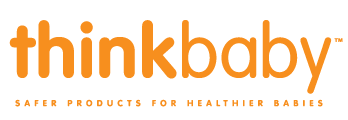Say NO to BPA
We've been talking to everyone who'll listen about the benefits of thinkbaby bottles! This very aptly named non-toxic feeding range is completely BPA free and has more performance enhancing features than you can shake a stick at. With the recent outrage exposing the all too common use of BPA in baby bottles, we urge you to make the switch now to thinkbaby BPA free bottles - the safer, non-toxic feeding solution.
The recent publicity exposing BPA as the nasty villian it is acts as strong reinforcement for the 'No More BPA' campaign fore fronted by Breast Cancer UK. Backed by leading health organisations such as UNISON, The National Childbirth Trust and the Cancer Prevention and Education Society, this campaign urges the UK Government to stand up and take action to stop BPA being used in the manufacture of baby bottles.
Without making you shake in your socks we felt we should outline some key reasons why BPA simply has to be banned in baby feeding products.
What is BPA?
BPA (Bis phenol-A) is described as a hormone disrupting chemical because it mimics the effect of hormones and therefore impacts on the hormone system. The chemical is widely used in the production of shatterproof plastics across the globe, including plastic baby bottles for sale in leading nursery stores throughout the UK.
What studies have shown...
Compelling scientific evidence highlights links between even very low levels of BPA and chronic conditions such as breast cancer, prostrate cancer, Type II Diabetes, Obesity, infertility and a myriad of developmental disorders.
The urgency to remove BPA from baby feeding products stems from three key elements of research which demonstrates:
'Babies under 12 months have greater difficulty metabolising BPA because the key liver enzymes required to eliminate BPA from the blood and body are substantially lower in infants than those of an adult. In addition, babies exposed to levels of BPA similar to adults receive much higher concentrations due to their smaller body mass. Furthermore, the newborn is more susceptible because its hormonal system is not fully developed.'
Source: www.nomorebpa.org.uk
The use of BPA in baby bottles
Baby bottles, due to the nature of their function, are heated repeatedly and subsequently washed. A study carried out in 2008 by a coalition of U.S public health NGO's found that heating bottles containing BPA causes the toxic chemical to leach in concentrations of 5-8 parts per billion.
'Heating bottles or pouring hot liquids into bottles, the presence of acidic or basic foods and beverages, and repeated washing have all been shown to increase the rate of BPA leaching from bottles.'
Source: www.chej.org
The baby bottles tested leached when heated, a concentration (between 5-8) in parts per billion, however the study also expresses concern at even very low levels of BPA. Levels as low as parts per trillion were found to alter cell function.
Canada, U.S.A and France say NO!
Last year the Canadian Government introduced a ban on the sale of any polycarbonate baby bottles containing BPA. This stance was taken 'to enhance the health and safety of newborns and infants up to the age of 18 months by reducing their risk of developing adverse health effects as a result of exposure to bisphenol A.'
Source: www.gazette.gc.ca
The US Environmental Protection Agency announced on 28th September 2009, that Bis phenol-A (BPA) would be one of six chemicals that could be reviewed as to its safety. The review could lead to enforcing labelling of, restriction or the ban of a chemical.
More recently, France has taken the action against BPA by banning the use of the chemical in baby bottles.
You can say NO!
Despite the disturbing evidence of the health defects BPA poses, in particular to infants, the UK Government has yet to ban this dangerous chemical from baby bottles and feeding products. The slow response from our Government does not mean you cannot take action yourself.
Say NO to BPA now by clicking here to make the switch to BPA free feeding solutions like thinkbaby.
You can also join the No More BPA petition against BPA by clicking here.
For more information on thinkbaby BPA free feeding solutions click here, email info@babame.com or call our super friendly team on 02830 84 80 50.
Love, The Baba Me Team x
Shop Here
Flickr
Web



Comments